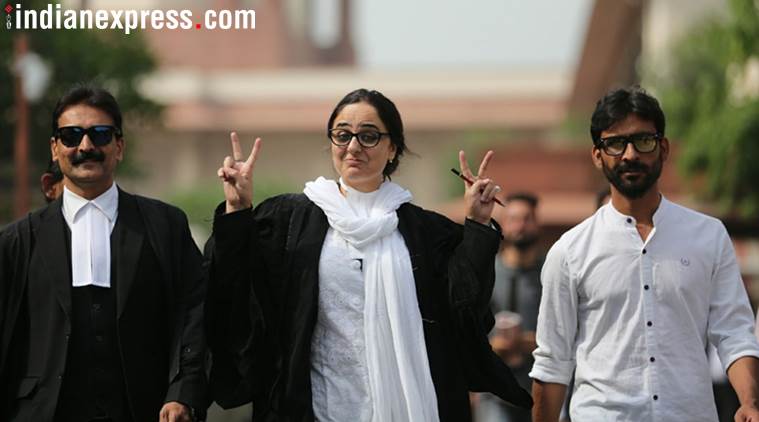 Kathua Rape case victims lawyer Deepika Rajawat gives the thumbs up after the case was transferred to the Pathankot court today. (Express Photo by Tashi Tobgyal)
Kathua Rape case victims lawyer Deepika Rajawat gives the thumbs up after the case was transferred to the Pathankot court today. (Express Photo by Tashi Tobgyal)
The Supreme Court Monday shifted trial in the gangrape and murder of a minor girl in Kathua from Jammu and Kashmir to Pathankot in Punjab. It directed that trial be held in-camera on day-to day basis, under the Ranbir Penal Code that applies to J&K. It allowed J&K to appoint a special public prosecutor for the case.
A bench of Chief Justice of India Dipak Misra and Justices D Y Chandrachud and Indu Malhotra, which vacated the stay it had imposed on the trial on the last day of hearing, directed that the trial in Pathankot be held on a day-to-day basis to avoid delay. This, the bench clarified, should mean no adjournment, and the examination-in-chief and cross-examination of witnesses done without break.
The bench said that the trial will be conducted by the Pathankot district and sessions judge who will not assign it to anyone else.
The victim, an eight-year-old girl from the nomadic Bakarwal Muslim community, had disappeared from near her home in a village close to Kathua in the Jammu region on January 10. Her body was found in the same area a week later.
The J&K police Crime Branch, which probed the case, filed the main chargesheet against seven persons and a separate charge sheet against a juvenile in a court in Kathua. The chargesheet revealed chilling details about how the girl was allegedly kidnapped, drugged and raped before being killed.
The girl’s father had moved the Supreme Court, apprehending threat to the family, their friend and their lawyer Deepika Singh Rajawat. A separate plea was also filed by two accused seeking that trial in the case be held in Jammu and the probe be handed over to CBI.
The apex court had issued a stern warning, saying it would transfer the Kathua gangrape-and-murder case from the local court if there was the “slightest possibility” of lack of fair trial. It had said that the “real concern” was to hold proper prosecution.
On Monday, the bench granted the request of advocate Indira Jaising, who appeared for the victim’s father, that the trial be held in-camera. But it did not entertain her plea that the proceedings be videotaped to avoid any future controversy. The CJI said the court could not create a new precedent and would allow only what was permitted in law.
The bench ordered that the statements of witnesses, which were recorded in Urdu, be translated to English.
Appearing for J&K, senior advocate Gopal Subramanium requested that the state be allowed to appoint a special public prosecutor for the case. This was allowed by the bench.
It also directed that “security provided to the juvenile accused will continue” and posted the matter for further hearing in July when the apex court reopens after the summer recess.
Jaising claimed that the situation was not conducive to hold the trial either in Kathua, Samba or Jammu districts as these were the centres of agitation in the aftermath of the gangrape and murder. She said the victim’s family was “very satisfied” with the Crime Branch probe.
Some of the accused in the case had demanded that the investigation be transferred to the CBI. Pointing out that the investigation team had been changed thrice, they contended that some of the officers also had cases against them. Appearing as an intervenor, advocate Anuja Kapur requested that the court keep open a window for a CBI probe option in case new evidence emerges in the future.
The court did not dispose of the plea for a CBI probe, but the CJI observed during the hearing why should the court get into it when the chargesheet has already been filed.
When pointed out that a petition demanding a CBI probe was pending before the J&K High Court, the bench said no other court shall entertain any matter related to the case as it was monitoring it.